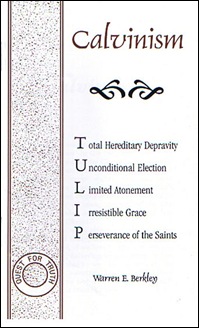 From the writing of the Remonstrance, to the Synod of Dort and until today the Salvation Debate has trodden wearily on. Truth keeps on marching though. As humans we are indeed sinners, but the grace of God enables all to make a conscious decision in regards to their salvation, it is a personal relationship that is entered into with deliberation and commitment. “Prevenient” grace or “grace before hand” has been given to all men, thereby enabling them capable of responding to the Gospel.
From the writing of the Remonstrance, to the Synod of Dort and until today the Salvation Debate has trodden wearily on. Truth keeps on marching though. As humans we are indeed sinners, but the grace of God enables all to make a conscious decision in regards to their salvation, it is a personal relationship that is entered into with deliberation and commitment. “Prevenient” grace or “grace before hand” has been given to all men, thereby enabling them capable of responding to the Gospel. The Doctrine of Sin is probably at the root of this entire discussion. Sin is universal and has permeated every facet of our globe and humanity. Sin is the violation of God's law and His will (1) has corrupted the human will and every other facet of our human nature, but God has provided a Lamb, a final sacrifice to remedy man’s inabilities. Sin, by the use of free-will, entered the world and human nature. It is also by use of that same free-will that we surrender this will to God, for His perfecting will. It is a decision by man to be guided by God, a total surrendering of self-will. God guides in genuine love and not with subtle force whereby one is eternally bound to a destiny, beyond their will.
Because of the sacrifice of Christ from the foundation of the world, God grants grace upon the entire human race. Paul declared that “…the grace of God that brings salvation has appeared to all men,” (Titus 2:11 NKJV). Luke declared that God “commands all men everywhere to repent” (Acts 17:30). Repentance comes by faith which is a reaction to the grace of God. Therefore, the grace of God is prevenient. This grace does not save them against their will, but it draws them, entices them, and illuminates them. The grace of God aids in overcoming the effects of the sin nature to the extent that they have the ability to accept or reject God’s plan. Election and predestination then are based upon God’s foreknowledge of human decision and not a unilateral imposition of a mechanistic blueprint of salvation’s particularity. God elects those who will accept Him and predestines the Body of Christ to glory, i.e. those who are in the elect. In Pauline epistles we see the use of plural pronouns (Romans 8:29, 30; Ephesians 1:5, 11) which are used to indicate a collective predestination of the Body of Christ, the believers world-wide.
James Arminius wrote: “Those who are obedient to the vocation or call of God, freely yield their assent to grace; yet they are previously excited, impelled, drawn and assisted by grace; and in the very moment in which they actually assent, they possess the capability of not assenting.” (2)
Conversely John Calvin wrote, “But if it is plainly owing to the mere pleasure of God that salvation is spontaneously offered to some, while others have no access to it, great and difficult questions immediately arise, questions which are inexplicable, when just views are not entertained concerning election and predestination. To many this seems a perplexing subject, because they deem it most incongruous that of the great body of mankind some should be predestinated to salvation, and others to destruction.” (3)
Practically interpreting the love of God and rightly dividing God’s Word causes me to understand that the grace of God enables all to make a conscious decision in regards to their salvation, it is a personal relationship that is entered into with deliberation and commitment. It is not human centered since God initiates with the giving of His grace. For God loved the world, so much that He gave His only, uniquely born son, the express image of His person, to extend atonement for anyone who will believe (John 3:16). The Gospel is not discriminatory but is for Jew and Gentile regardless of age, gender, locality, or lineage.
Notes:
1. Louw, J. P., & Nida, E. A. (1996, c1989). Greek-English lexicon of the New Testament : Based on semantic domains (electronic ed. of the 2nd edition.) (1:772). New York: United Bible societies.
2. Works of James Arminius, Disputations of Arminius, “XVII. On the Vocation of Sinners to Communion with Christ, and to a Participation of His Benefits” PC Study Bible formatted electronic database Copyright © 2003 by Biblesoft, Inc. All rights reserved.
3. Calvin, J., & Beveridge, H. (1997). Institutes of the Christian religion. Translation of: Institutio Christianae religionis.; Reprint, with new introd. Originally published: Edinburgh : Calvin Translation Society, 1845-1846. (III, xxi, 1). Oak Harbor, WA: Logos Research Systems, Inc.

No comments:
Post a Comment